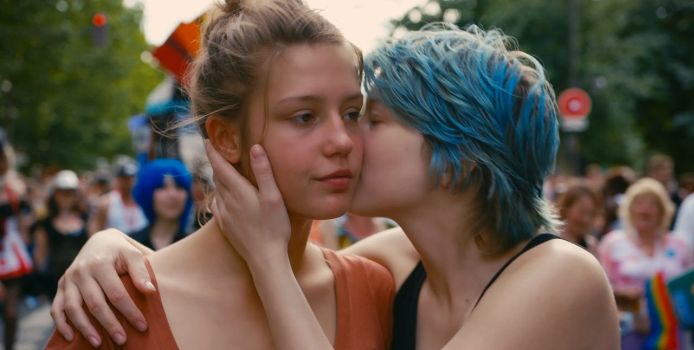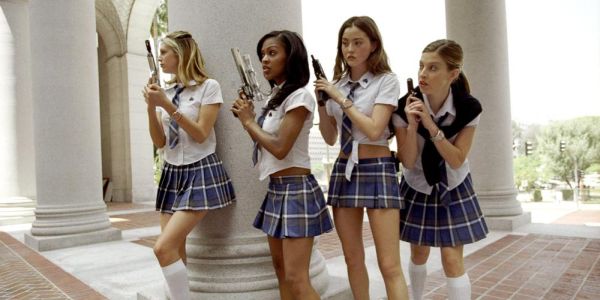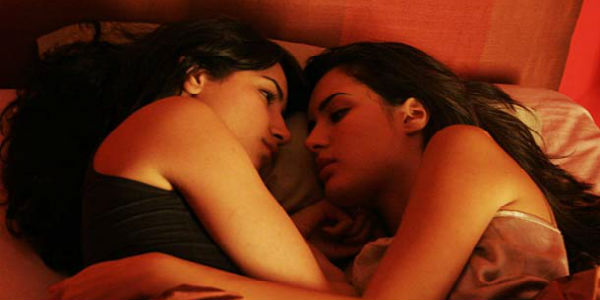Why It’s Important To Make More Diverse LGBT Films

Cherokee is a 20-something human from London, UK. She has…
If you read the premise for D.E.B.S (2004) on IMDb or watched the trailer, you’d probably come to the conclusion that it’s a pretty generic comedic satire. A silly movie to turn your brain off to for 90 minutes, harmless at best. And that’s what it is, at least at the start.
The D.E.B.S, which stands for Discipline, Energy, Beauty, and Strength, are a group of girls dressed in Japanese-like school uniforms, carrying some serious weapons and kicking a good amount of butt. Amy (Sara Foster), the D.E.B.S’ honour student and looked at as the level-headed one, is having a little bit of a personal crisis. She’s in a questioning relationship, she’s not sure where she fits into the world of D.E.B.S, and if she even wants to be a spy.
Then, she meets Lucy Diamond (Jordana Brewster) – the film’s villain. In strange circumstances, Amy and Lucy get to talking and realise that they are more alike than they first thought. The usual “villain and hero share things in common and become friends”, thing. That old storyline. But it’s not. The two end up kissing, and, even though Amy is reluctant at start to get close to Lucy – they fall in love, vowing to keep their relationship secret. As with all forbidden loves, they are eventually found out, but it doesn’t stop them from trying to be together.

The lack of marketing around this major element of the film (it’s a love story, really) completely threw me off. I shouldn’t have been surprised by this character turn, but I was. Not because it centered around two women in a loving relationship, but the fact that it is this kind of film depicting a Romeo and Juliet-type affair. A comedy.
Comedy has become a bit of a bro-dude archetype. Dick jokes, sexist jokes, racist jokes, homophobic jokes – they’re all in there (I am sure Seth Rogen accounts for about 75% of them, but don’t hold me to that statistic). So, to have a somewhat positive relationship between two women, where it isn’t sexualised for the benefit of men, took me a little by surprise.
Visibility doesn’t equal representation
Films like D.E.B.S give a different kind of representation – LGBT visibility in a genre that is notorious for ridiculing characters for their lack of straightness. Even though it is a wonderfully bad kitschy film, it should be applauded for its bravery. Tackling that genre with a relationship that would usually be the end of a joke (or titillation for dudes) takes balls. And it’s certainly got that. It isn’t just comedy that usually has a problem with depicting LGBT relationships, though. The whole film industry aren’t getting it right.
There are quite a few films that shove in the “token” gay guy, because, hey, that really shows representation. Tokens have always been known for not having progressive writing, rather, they’re there for the sake of “diversity”, even though there is really nothing diverse about having a character every inch of a stereotype imaginable.

It’s more than just having visible characters who don’t identify as straight, or with any particular genders. It’s about telling different stories, giving LGBT people the opportunity to be heard outside of how they would identify themselves. While it is important to tell coming-out stories that are key to LGBT experiences, it is just as important to present LGBT characters in situations of normality – genres where you would tend to find straight bros.
We need films that highlight the struggles of being LGBT just as much as those that don’t solely focus on gender and sexual orientation. Pride (2014), for one, is a tonally different film than what we’re used to seeing with central LGBT characters. Though it is about something that, in actuality, is quite serious, it doesn’t take a hard approach to a story that you might expect. Not everyone’s experience growing up and living as an LGBT person is going to be the same, either. It’s important to recognise the LGBT issues that happen across the world too, as – when you live in a country, like the UK, as I do – we are far more accepting and understanding than many other places.
LGBT characters have more to offer than their sexuality
Directors, like Xavier Dolan, are challenging and reworking what it means to be gay on film and the kind of stories that can be told. There is a vital conversation being created thanks to queer filmmakers, but there is still a long way to go (particularly when it comes to representation in mainstream films).
Some movies, such as Circumstance (2011), do get it right, though. A film which depicts a relationship between two young women isn’t necessarily anything new, but it’s importance lies in the fact it’s set in Iran, a country that doesn’t recognise the plights of gay men and women. You don’t hear about these stories often and it gives a new perspective of the continuing struggles for LGBT people to be heard, to be noticed.
Religious conflict, when it relates to sexuality, is such a difficult issue to tackle and Circumstance does that. While it’s not necessarily handled as well as it could have been, My Brother the Devil (2012) also does something similar. It takes you into a gang world, a place notorious for its high testosterone and masculine attitudes, and has you watching a relationship form between two men, one a young, gay Muslim man (who is also the film’s gang leader) and the other a white, middle-class artist.

Blue is the Warmest Colour (2013) is just as needed, but in a different way. It’s a story focused on situations we all go through – falling in love, having sex for the first time, the difficulties of being in a relationship. The background to the film relates to the sexuality of Adele and Emma, the two women in a relationship. It’s mentioned in passing, in arguments at the school playground, in awkward conversation with parents – but it never overtakes the film. There are experiences in Blue that are relatable to those in the LGBT community just as there are ones outside of it. It’s a love story regardless of who falls in love.
Defying the unwritten homophobic laws in Hollywood
Not all movies are in a favourable view as those mentioned, sadly. When LGBT relationships are depicted in film, they usually end in the overly tragic kind of way, like Brokeback Mountain (2005). Nothing ever seems to go right. There aren’t any happy endings, just perpetual heartbreak and permanent singledom. Even the films that do get it right have a problem with really damn depressive outcomes. I mean, where are all the LGBT romcoms at?
It’s about striking a good balance in the kind of movies that are released with LGBT representation, and not having one type of story, confined to one genre. We haven’t gotten to a stage of complete acceptance in society yet and films like Circumstance can challenge perceptions around homophobia, race and religion. But, in order for there to feel like we are accepting those from an LGBT background, we need to start being inclusive – introducing characters who don’t identify as straight into blockbuster action movies and comedies, not making everything about their sexuality but giving them development, a story: defying the unwritten homophobic laws in Hollywood.
It’s not even about wanting more and more diverse LGBT representation in different films, it’s about needing it. You know, if a film like D.E.B.S can do it (and ten years ago, at that) what is the hold up here? C’mon film industry people, you can do better.
Are we still lacking in a diverse range of LGBT films? What are some of your favourite queer leading movies that do positive representation right?
(top image: Blue Is The Warmest Colour – source: Wild Bunch)
Does content like this matter to you?
Become a Member and support film journalism. Unlock access to all of Film Inquiry`s great articles. Join a community of like-minded readers who are passionate about cinema - get access to our private members Network, give back to independent filmmakers, and more.
Cherokee is a 20-something human from London, UK. She has a morbid fascination with Justin Bieber, is a collector of cute hats and watcher of bad Asian rom-coms and B-movies. She can usually be found in her fortress of solitude - lying in bed with a comic book in hand. You can check out more of her writing at www.cherokeeseebalack.tumblr.com. Jim Jarmusch is her hair inspiration, Tahar Rahim is her forever-film crush and one day she hopes to be as cool as Marlon Brando.













